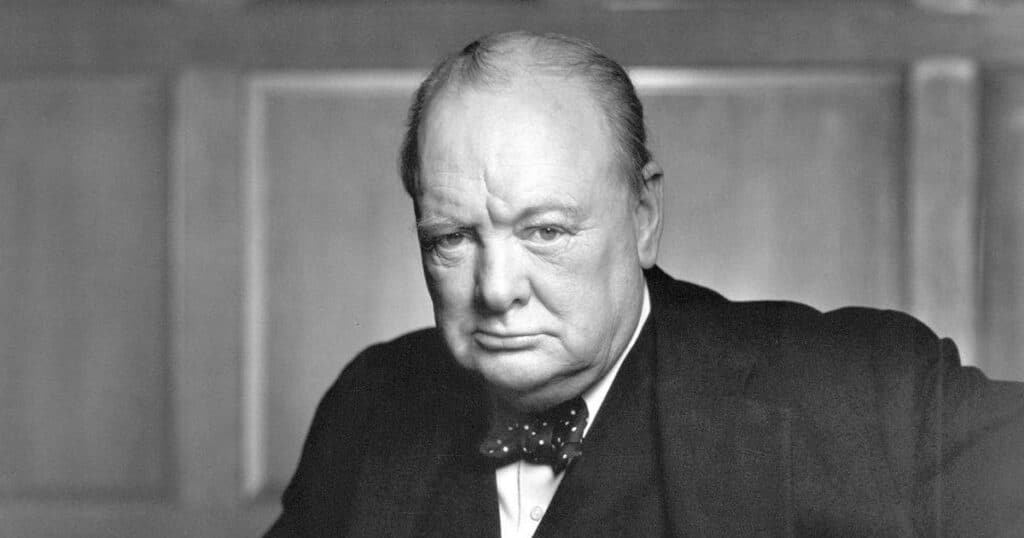
Great Crisis of Our Time
Nearly 100 years ago, Winston Churchill wrote an essay called the “Mass Effects in Modern Life.” In it he wondered whether the best of human potential had been handed over to assembly lines and machine processes, what he referred to as the “magic” of mass production. “Science in all its forms surpasses itself every year,” Churchill observed. The year was 1925. Churchill had seen a great deal of change in his life. He had lived through the mass sacrifice and suffering of the Great War, the rise of a collectivist ideology in Soviet Russia, and a second wave of industrialization that stretched from the late nineteenth century into the early twentieth century. Though science had delivered “material blessings” in “measureless abundance,” the face of society was changing.
Gone were the master craftsmen and creators. Gone were the pioneers and adventurers, whose bold choices spurred the enterprise that followed their discoveries. In the place of “eminent men” was industrial repetitiveness, powerful and productive but lacking in whatever elusive qualities that once imbued the lonely individual with a sense of honor, and an ambition to leave his mark on the world. Modern civilization proved “hostile to the development of outstanding personalities and to their influence upon events.” More artist than politician, Churchill saw through the mysteries of the times and concluded that as man becomes more dominant over science and technology, “the individual [himself] becomes a function.” This tiny speck that is a person no longer thinks of “himself as an immortal spirit, clothed in the flesh, but sovereign, unique, indestructible.” He loses his faith; he loses himself.
Modern life seems depleted of meaning and purpose, writes political philosopher Glenn Ellmers. In his new book The Narrow Passage: Plato, Foucault, and the Possibility of Political Philosophy (Encounter, 2023), Ellmers explores what went wrong in the American political community over the last 100-plus years, tracing a line from Machiavelli to Nietzsche on to Hegel and then Foucault in search of that rogue strain of thought that produced this modern condition. At less than 100 pages, the book offers no solutions. Instead, like Churchill, Ellmers illuminates the problem: how the individual became part of an aggregate; why “our dignity has no quantitative value.” I spoke with Ellmers about his book and ideas. What follows is a lightly edited transcript of our conversation.
What is the “great crisis” of our time?
Most educated people in the West do not know what they live for or what their society stands for. There are still many people who believe in God, but there is a question of whether the churches are just another manifestation of modern liberalism. [Political philosopher] Leo Strauss pointed out years ago that the West no longer believes in anything, and, in a way, we are living with the consequences of what Nietzsche pointed out—that “God is dead,” by which he meant that most modern, educated people no longer believe in God. Nietzsche described this as nihilism, and this loss of faith—that life doesn’t have any meaning—is the great crisis of our time.
But a “great crisis” typically entails war, famine, or depression. If you believe there is a crisis of belief, then what can you point to that reveals the crisis?
The intensity of our politics reveals how desperate we have become. Nietzsche was way ahead of his time, and he saw long before other Western minds that the belief in progress was empty. Karl Marx and Hegel believed in utopia on earth, but they were selling a false promise, and it took the catastrophes of World War One, World War Two, and the atomic bomb—you might say all the tech progress of our times, too—to reveal the sense of emptiness, this feeling that as people we have no purpose.
You note the allegory of Plato’s Cave—that we live inside the cave and the true legislators are those who create the flickering images on the cave’s wall. If we are experiencing a crisis of belief, then who is creating the images?
Many people. Every society lives in its cave in the sense that a society must have traditions and that those traditions are communicated through narratives containing heroes and villains, the things society admires and disparages. I write in the book about pop idols and musicians, but truly they are second- and third-rate purveyors of the narrative. The true shapers are the philosophers, but no one reads the great philosophers and so their work becomes watered down and distorted. I refer to popular culture figures as the poets of our times because they transmit the ideas that reinforce larger narratives. Once, the West had agreed-upon heroes and mythologies, but the images are being altered and so is the underlying narrative.
Take, for example, Silicon Valley. I think tech lords in Silicon Valley do not have original thoughts whatsoever, but the conflict I see on the Left is that the people in Silicon Valley represent the role of the expert class. This goes with the prestige accorded to elite universities and the deference claimed by scientists and educated officials who make up the administrative state. Anthony Fauci said we had to defer to the expertise of the scientists, even for questions predicated on moral or ethical issues.
Post-modernism tells us that truth is merely a function of power, that mathematics is a function of white hegemony. There is an inherent flaw in this ideology because you cannot claim to rule based on superior scientific knowledge, then go on to claim that all knowledge is “just a narrative” or a product of the patriarchy. I don’t claim any originality in these ideas, which come from Leo Strauss, Harry Neumann, and Harry Jaffa. Strauss argued that nihilism will ultimately win out because the scientists do not have a philosophical basis. Technology is method without meaning, process without purpose. The technologist will ultimately lose to the ideologues, the anarchists. I think you see this most clearly in the elite universities. Look at any liberal arts program and ask what is the basis for objective truth—the professor will laugh in your face. Talk to them about natural right. Talk to them about an objective basis of justice or human nature. These questions are absurd to the intellectual class. Our Silicon Valley experts do not know this intellectually but they have absorbed it through the university, media and culture. Everything is sardonic. Everything is subjective. I actually enjoy the show “Seinfeld” but it was self-consciously playing on the idea of upper middle-class people in Manhattan who live frivolous lives, it was the “show about nothing.”
“Americans are lied to on a daily basis,” you write. “This has become normal, even expected.” Are you talking about false advertising, puffery in business transactions or something else? What do you mean when you say that Americans are being “lied to” on a daily basis?
Among the elite class, truth has been rejected as not having any objective basis. Among the working class, it has become confused. I don’t want to be too down on the churches, but many mainstream churches are just repeating the dogmas of modern liberalism—politically correct symbols, causes, and sermons. You see them everywhere. People are fed a steady diet of politically correct propaganda. Professor Charles Kesler wrote an essay called the “three waves of liberalism,” in which he drew on an essay from Leo Strauss called the “three waves of modernity.” Strauss explains how the early modern thinkers like Hobbes, Machiavelli, and Descartes had put their faith in science and reason to create the rational state, but those ideas became more and more radical until culminating in the nihilism of Nietzsche and Hegel.
Kesler adapted this to modern America. The first wave is the intellectual rejection of the Constitution and the underlying principles of natural right contained in the Declaration of Independence. The progressives were students of German philosophy and they rejected natural right in the decades leading up to the Civil War. By the turn of the twentieth century, German thought was coming into America in an explicit way as graduate programs in this country were heavily shaped by German philosophers. You notice this shift personified in the rise of Woodrow Wilson; he was the only professor of political science to become president, and his academic work explicitly repudiated the principles of constitutionalism. The second wave was economic. That came with FDR and the vast expansion of the federal government to claim a host of new responsibilities and the birth of the regulatory state. The third wave is in the sixties and that’s the cultural wave. Sexual revolution. Feminism and the attack on the traditional family. These have been harmful to the health of the Republic. Along the way somewhere, truth fell by the wayside.
What was the role of the Second World War in transforming values? In the Studs Terkel book, The Good War, one veteran comments that returning to society was like being “pinched back into the meanness of the soul.” There’s a theme in the Terkel book that war was hell but veterans were surprised by what they discovered about their country, too—that America had become competitive in a Machiavellian sense, that everyone lived by fear and “phony standards,” that people didn’t bother to help one another.
Well, war has always produced a sense of camaraderie, and warriors have always fought for each other, in addition to whatever cause the generals and strategists have. But the cultural revolution started in the 1950’s. There is an idea that the hollow society, the consumer society, the increasing de-spiritualization, demoralization of modern life began in the 1950’s. John Marini, another teacher of mine, says that it was really after WWII that the ruling class stopped being interested in America and the common good and began being interested in itself primarily. Strauss says we defeated a nation on the battlefield and yet that defeated nation may prove victorious through the power of its ideas, what came from Nietzsche, Marx, and Hegel. Strauss means that we obliterated the Nazis and defeated the Wehrmacht, but the German philosophers permeated our culture and intellectual class. It remains an open question. There is no determinism in human history.
You cite French philosopher Michel Foucault as the most incisive intellectual for explaining the current state of social science, particularly as it pertains to the relationship between power, knowledge, and truth. Why Foucault?
If you’re my age and you lived through the 1980’s and 1990’s, we all made fun of Jacques Derrida and Foucault. We thought they were ridiculous but now people are coming back to them. Foucault was one of the French post-modernists who tried to describe what social science looks like in a Nietzschean world. What happens when we abandon the ideal that there is an objective ground to the universe? Foucault says, well that doesn’t mean life just stops, but, without any objective ground for making moral judgments, government becomes a system for making judgments based on power. People are still expected to believe in truth, but how does that work—how does the narrative dictate truth? Every cave shapes opinion by deciding what’s important, what gives status, and what we look up to. For example, if you went to Yale, then your status or degree is tied to the regime, and so you’ll never really want to reject it. Even the people who are ruling have been coopted into the anonymous power structure.
Foucault knew that modern power structures operate in an impersonalized, institutional way, and that the structures coopt people to influence their thoughts and behavior. Now that the Left is the establishment, people on the Right need to get their minds around the fact that they are not the establishment any longer. Our government is politicized, our law enforcement is politicized. People have to get their heads around the fact that the Right is the counter-establishment, and so thinkers like Foucault are very helpful to those of us battling oppressive power structures.
When you talk about “coopting people,” my thoughts turn to electronic surveillance and collection of biometric data. We did this in Afghanistan to synthesize from the data a “pattern of life” for enemy combatants. Now, a similar kind of collection is pervasive in society—against Americans. What does it mean?
Well, another way the structures control you is by coopting your identity. Foucault liked this term ‘the panopticon’. It was Jeremy Bentham’s idea about how prison cells should work, which allowed the guard tower to look out into all the prison cells. It’s become an apt description for the modern surveillance state, that we are at all times under the watchful eyes of someone. I think even Foucault would be shocked at how pervasively this technology has been deployed.
I know you say the “great crisis” of our times is spiritual, but what do you say about technology?
Technology cannot explain itself or justify itself, but in a way it is seemingly perpetuating itself. We want faster phones and more titillating entertainment. No one stops to deliberate whether it’s good for us. Heidegger said that once we see the world as a commodity to be mastered, once nature becomes raw material to be manipulated, then technology will have taken on a life of its own. It’s an end without any purpose but it is self-perpetuating. We want to master nature to fulfill our desire but there is no interest in the common good. Aristotle warns about seeing technology as a good in itself, advising that it must be kept under political supervision, that it must serve the common good and the virtue of the citizens.
I’ll add that Strauss took very seriously the theory of Martin Heidegger, who was Nietzsche’s greatest student. He was the most intellectual of the Nazis, a strange man but a profound thinker. Heidegger thought science and technology had massively distorted human life, that the hubristic attempt to make the world and nature conform to our desires was backfiring. Science and technology turned nature into a commodity. And, science and technology turns human beings into commodities, too, mere objects to be manipulated.
John Waters is a writer in Nebraska. His novel River City One publishes this fall.
This article was originally published by RealClearHistory and made available via RealClearWire.



